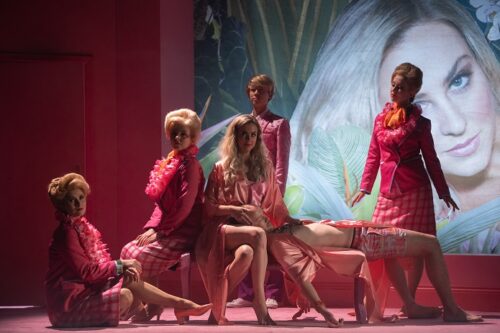 United Kingdom Longborough Festival Opera 2022 [4] – Emerging Artist Double Bill, Waley-Cohen, Spell Book; Francesca Caccini, La liberazione di Ruggiero dall’Isola d’Alcina: Soloists, CHROMA Ensemble / Yshani Perinpanayagam (conductor). Longborough, Gloucestershire, 31.7.2022. (CP)
United Kingdom Longborough Festival Opera 2022 [4] – Emerging Artist Double Bill, Waley-Cohen, Spell Book; Francesca Caccini, La liberazione di Ruggiero dall’Isola d’Alcina: Soloists, CHROMA Ensemble / Yshani Perinpanayagam (conductor). Longborough, Gloucestershire, 31.7.2022. (CP)

Production:
Director – Jenny Ogilvie
Designer – April Dalton
Lighting designer – Jake Wiltshire
Assistant Director – Emily Ling Williams
Spell Book
Cast:
Spell Lilith – Sarah Richmond
Spell for Sex – Bernadette Johns
Spell for Women’s Books – Nia Coleman
Spell for Logic – Sarah Richmond
Spell for Joy – Keith Pun
Spell for Reality – Jessica Robinson
La liberazione di Ruggiero dall’Isola d’Alcina
Cast:
Alcina – Lauren Joyanne Morris
Bradamante/Melissa – Simone Ibbett-Brown
Ruggiero – Oskar McCarthy
Neptune – Joe Chalmers
River – Ruairi Bowe
First Lady – Nia Coleman
Second Lady – Bernadette Johns
Third Lady – Sarah Richmond
Shepherd – Xavier Hetherington
Siren – Jessica Robinson
Plant/Monster – Aaron Holmes
Messenger – Keith Pun
Excitement levels were rising rapidly towards the end of Longborough’s 90-minute interval on Sunday night as extra time in a certain England football match against Germany at Wembley reached its climax. Would the final whistle go before the bell calling patrons to return to their seats for the second item of the double bill? Thankfully, it did and word very quickly spread to confirm that the huge investment in women’s football in the UK had paid off handsomely! So too, the investment in the Longborough Emerging Artist programme has paid dividends. Their 2021 production, The Cunning Little Vixen, was extremely well received. 2022 is quite a different matter! A double bill of a brand new work by Freya Waley-Cohen – Spell Book was coupled with a challenging ‘revival’ of Francesca Caccini’s 1625 La liberazione di Ruggiero, one of a number of court entertainments promoted by Christine of Lorraine and her daughter-in-law, Maria Magdalena, designed to dazzle visiting dignitaries. The success of these court events helped Caccini become the highest paid musician in the household.
Waley-Cohen’s compositions are known for their strong melodic lines; she has an interest in magic, myths and the occult dabbles and her works take a look at the modern world with its many diversity challenges. Waley-Cohen’s song cycle, Spell Book, is inspired by the composer’s encounter with Rebecca Tamás’s collection of poems WITCH, spell-poems taking us into a place where the right words can influence the universe. In her interview in the programme with Sophie Rashbrook, the librettist of her own song cycle, Six Songs of Melmoth, Rashbrook suggests Waley-Cohen ‘embraces Tamás’s gleeful, subversive style’ extrapolated from the strange book of poems that merge feminist exploration with occult expression. Conductor Yshani Perinpanayagam employs tight control over the small virtuosic CHROMA Ensemble who sit on stage as the ‘actors’ move from writhing on the floor as the word WITCHES is painted in large red letters on the vast white backdrop into a state of undress. This vast white backdrop soon becomes a central element in the story, as hands appear through holes before ‘actors’ eventually leave the stage through large slits in this same backdrop, prior to its ultimate destruction. An overhead projector – a fond reminder of training programme delivery days – is employed with the aim of helping a bemused audience follow the script. However, at times the language is incomprehensible. Was the disappearance of ‘actors’ through the slits to symbolise their awakening from a bad dream? Certainly, the event left a powerful impression on the audience, many of whom will have been pleased to have been awakened, if this was in fact a bad dream.
Sarah Richmond has a busy evening singing both Spell for Lilith and Spell for Logic. She is well supported by Keith Pun whose fine countertenor voice is one of few highlights of this first of the double bill, performed without fault and with total conviction.

Francesca Caccini’s La liberazione di Ruggiero is acknowledged as the oldest opera by a woman composer. Tracing the activities of the beautiful enchantress, Alcina, the action follows the hazardous route Bradamante travels to free Ruggiero from Alcina’s spell and the resulting collapse of her magical realm. With the conductor and orchestra now in the pit, the stage backdrop is a vast replica of one of those Page 3 images of years gone by, the sort of thing the many visitors to the Morgan factory, locally in Malvern, remember as a feature of the workshop walls – now long gone. Director Jenny Ogilvie and Designer April Dalton decide to clad the ‘actors’ in hideous pink with the opening personalities reminding the audience of the remarkable Beverley Sisters at their prime with their memorable number, The Naughty Lady of Shady Lane.
Baritone Oskar McCarthy sings with the confidence and panache one should expect of Ruggiero; Lauren Joyanne Morris is a joy to watch on stage, her mezzo-soprano voice helping to make this an uplifting total experience. Her mezzo colleague, Simone Ibbett-Brown, sings the roles of Bradamante, who reinvents herself as Melissa. Ibbett-Brown’s final aria is very well delivered as she reminds the mortals of the dangers of a life of infidelity. Fortunately, the island inhabitants celebrate their release with a dance to the sounds of Barry White’s, You’re the First, the Last, My Everything! which was part of Perinpanayagam’s quixotic reorchestration of Caccini. With the telling opening line of the song (‘We got it together, didn’t we?’) – a further clear reminder of how the Lionesses managed their win and how the investment paid off for them. For many in this Emerging Artists initiative, the investment will also pay off.
Clive Peacock
